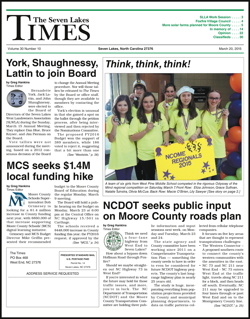 There are sharp differences between the two candidates vying for the District II seat on Moore County's Board of Commissioners, and those differences were on display at a League of Women Voters Candidates Forum in Pinehurst's Assembly Hall Thursday evening, October 11.
There are sharp differences between the two candidates vying for the District II seat on Moore County's Board of Commissioners, and those differences were on display at a League of Women Voters Candidates Forum in Pinehurst's Assembly Hall Thursday evening, October 11.
The audience for the event was largely comprised of league members; candidates and their families; and other elected officials. The small turnout may have been the result of a television schedule for the evening that included a US Vice Presidential debate, as well as the Yankees-Orioles Major League Baseball playoff game.
Candidates for School Board, US Congress, and District Judge were on hand to answer questions from the League, but the most interesting conversation of the night may have been that between Democratic challenger Ellen Marcus and Republican incumbent Nick Picerno, both seeking the District II Commissioner's seat. [A video recording of the evening's proceedings is available on the Vimeo webpage of Bill Cochrane, who records a wide range of local public meetings.]
Marcus: The County's problem is poverty
"I grew up cash poor and resource rich," said Marcus, in her introductory statement. She explained that the meager family income that characterized her East Texas childhood was supplemented by hunting, gardening, and subsistence farming.
It may be those modest roots that make her particularly sensitive to the day-to-day challenges that face lower-income families in Moore County.
She pointed out that the poverty rate in Moore County jumped from eight percent to nineteen percent between 2008 and 2011 -- one of the fastest rates of growth in the nation. Noting that poverty and the literacy rate "are codependent," she recounted how the children in her East Texas schoolroom were literally segregated by socio-economic status, with the poor kids on one side of the room, and the better-off kids on the other.
"Victor Hugo said 'He who opens the school door closes a prison'," Marcus continued. "If we do not check our poverty," she added, then the County's new jail "was a good investment."
Noting that she had studied the League's report on poverty among the County's children, she called it "an eye-opener," adding "we can no longer say 'It's a beautiful day in Moore County'."
A Commissioner who can say he spent his four years not raising taxes, might deserve "a pat on the back," Marcus said. "But If I could stand here in four years and say I was part of a countywide effort that had all third graders reading at grade level," had trained Moore County's workforce for today's jobs, "and had made a dent in Moore County's poverty level, that would be something to be proud of."
Picerno - Refining government; cutting taxes
While Marcus wants County Government to do more, Moore County native Nick Picerno said he had spent his four years in office working "extremely hard to refine government and make it more responsible to the people" and, in particular, take "just what is necessary in taxes."
Picerno pointed to the County's last revaluation of real property -- six years ago -- as a key moment in his thinking about local government. Property values rose sharply in the revaluation, he explained, and the Board of Commissioners, rather than adopting a revenue-neutral tax rate, instead increased the taxes paid by County citizens by thirty-one percent.
The passage of a School Bond referendum the following year resulted in an additional twelve percent tax increase, Picerno explained.
"Over the past four years, we have worked really hard to make sure that we are accountable for your money, and we have actually reduced your tax rate by 1.9 cents," Picerno said. "If I'm re-elected, we will continue to be fiscally responsible -- in a time when government seems to think that taking your money and deciding how they want to spend it is the proper way to go."
"Here in Moore County, Picerno continued, "we feel like we want to define the needs of government, try to help people be personally responsible -- and take just what is necessary to fund the things that are important to the citizens of this County."
Marcus Priorities: Affordable housing, literacy, and public transportation
One of the questions the League submitted to the candidates in advance asked them to name the three most critical problems facing the County, and explain what could be done about them.
Affordable housing, literacy for all ages, and public transportation were Marcus' top three. To address them, she said "We need to think outside the box," pointing to projects like the architect Samuel Mockbees' Butterfly House -- an affordable housing design developed for rural Alabama. "It was a house that the rural impoverished could afford," Marcus explained, "and that could instill pride in ownership."
"We don't need yet another luxury housing development built away from existing infrastructure," Marcus said. "What makes sense for Moore County is developing more densely populated communities in proximity to resources," instead of spending more and more money on infrastructure to "catch up with the urban sprawl."
"A car is a lifeline for employment," Marcus said, but many can't afford to purchase a car. She pointed out that public transportation is critically important for students at Sandhills Community College, for seniors, and for those who need to transportation to work. She noted that the County already has a bare-bones public transportation service that could serve as a starting point for building a more comprehensive system.
Marcus said she had recently learned from Moore County Schools Superintendent Aaron Spence that a child who is not reading at grade level by third grade is significantly less likely to graduate from high school. And she noted that the adult illiteracy rate in Moore County is a shocking twenty-five percent.
The school system "needs the resources to get kids reading," she said, including tutoring and after school literacy programs. And "teaching illiterate adults to read is the key to making them employable," Marcus added.
Picerno Priorities: County Manager, Revaluation, Water & Sewer
Reflecting on Marcus' comments, Picerno cautioned that the County Board of Commissioners is "somewhat limited in what we can do." Consequently, the three upcoming challenges to which Picerno pointed were more tightly focused on the County's current to-do list.
"Ideas are great," he said, "but when you get down to the job, the three things that we can affect are these:" finding a county manager, holding taxes level during the upcoming revaluation, and continuing to improve the water and sewer infrastructure.
Picerno said the Commissioners must find a replacement for retiring County Manager Cary McSwain "that will look after the employees, that will look after the citizens of this County, and make sure that the Commissioners policies are carried out."
The revaluation will take place in 2015, and Picerno reminded voters that "the last time it happened, taxes went sky high." "The easy choice to to just take more of your money," he said, adding that the software company he founded didn't have the luxury of simply sending their customers an extra invoice when the firm needed more revenue.
"It's your money, and our responsibility, when we reevaluate your taxes, to make sure your tax rate does not go up, and more money does not come out of your pocket."
Picerno pointed out that, during his term, the County has added two million gallons of production capacity to the water system, as well as authorizing a sewer plant upgrade that expanded capacity by nearly thirty-five percent.
"As a Commissioner, we have to stay focused on the things that we can affect, that we can take care of," Picerno said. "The things that were mentioned [by Marcus] are great ideas, but they are not in our purview as Commissioners."
Will you raise taxes?
Among the written questions submitted by the audience question was one that read; "In this time of recession, do you believe we need to raise taxes in the county, and, if so, why?
"We do not have a revenue problem in this county," Picerno responded. "We do not need to raise your tax rate." He said the county needs to prioritize its spending -- and the top priority is schools.
He pointed out that the County's contribution to Moore County Schools' operating budget has grown from $24.9 million to $25.5 million during his time on the Board. Focusing on state and federal education funding, Picerno said "My problem with the money that is going to the schools is that it is not going to the classroom."
"So, no, I would not be in favor of a tax increase," he concluded.
Marcus also expressed skepticism about increasing taxes, though she focused her comments on the impact a tax increase might have on less affluent households.
"When you look at the poverty rate in Moore County," Marcus said "we are not doing great. We should try very, very hard not to raise taxes, because we have people in this County who just can't afford it."
Instead, Marcus argued, "We need to get very creative about how we go about working together, sharing resources, getting all the entities working together, creating community groups that are willing to work together to find grants that can benefit the schools, benefit someone making their home more energy efficient.
But, if a tax increase were necessary to fund the school budget, Marcus said she would support it. "Our schools have received cut after cut" in state and federal funding, she said, "and they need more cushion from the County."
Planning and economic development
The League asked the candidates in advance to explain the role they saw for land use planning -- and how the Commissioners could encourage economic development.
"Four years ago, we added a long range planner position," Picerno said. "We put some emphasis on planning."
Cautioning that "you can have not enough planning or two much planning," Picerno drew on two personal experiences to explain. One of the neighbors of the Picerno's previous residence, he explained, decided to get into the heavy equipment business, using his residential property as the business location. Ultimately, the "too little planning" that allowed that use of the property resulted in the Picernos relocating to a new neighborhood.
On the other hand, when Picerno's company, Southern Software, was building its first office, "we ran into all kinds of rules and regulations that drove up the cost, and we almost were not able to build the building."
"So planning is important, but it has to have the proper balance," Picerno said.
Noting that she would be spending the upcoming weekend walking across Moore County, focusing on its small towns and communities, Marcus pointed to the importance of "thriving-multi-generational" locally-owned hardware stores to the County's smaller communities.
"The businesses that stay here are the ones that are locally-owned," Marcus said, pointing out that the American-made dress she was wearing had been purchased from retailer-manufacturer Phoenix Fashions in Seven Lakes. Consequently, the County's economic development efforts need to focus on local entrepreneurs "instead of courting large corporations." She pointed to Starworks, a successful business incubator in Montgomery County that has spawned the creation of a number of growing businesses.
The best support that the County can provide is a cohesive land use plan," Marcus said. But it is the responsibility of the Commissioners to make sure that development ordinances, as well as infrastructure development and other decisions are in line with the "community vision" embodied in that plan.
